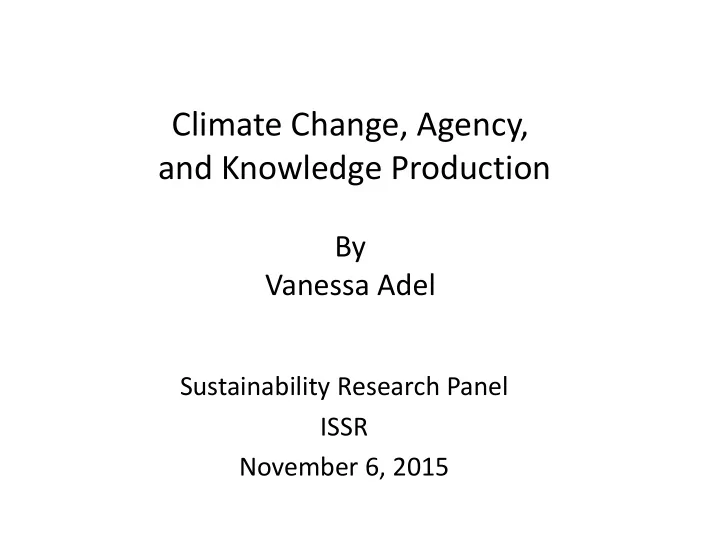

Climate Change, Agency, and Knowledge Production By Vanessa Adel Sustainability Research Panel ISSR November 6, 2015
Climate Change Predicament For 650,000 years, atmospheric carbon dioxide had never been above 300 parts • per million. This changed in the late 1940s. Now, we are just past 400 parts per million. • As a result, average temps of the planet have risen – about 1 degree Celsius. Most of the rise in temps has occurred since the 1970s, with all 10 of the hottest years occurring in the last 12 years. The official consensus is that we can not live in conditions higher than a change of 2 degrees Celsius. Climate change is impacting: sea levels (rising), ice sheets (shrinking), snow cover • (decreasing), ocean acidification (increasing), extreme weather events (increasing); all of which creates formidable environmental stress, habitat losses, and species extinction across the planet’s ecosystems. • The Intergovernmental Panel on Climate Change says a 1.5°C average rise may put 20-30% of species at risk. If the planet warms by more than 3°C, most ecosystems will struggle. We have 5 times as much fossil fuel as scientists think is safe to burn • Some Pacific islanders are already relocating their communities • Migration, food scarcity, flooding, drought, and resource wars are already • exacerbated by climate change • By 2100, areas in the Persian Gulf will have heat waves that will be “intolerable to humans” (Pal & Eltahir, Nature Climate Change , Oct 26, 2015)
What Are We Going to Do About it?
Many people are doing things to tackle climate change Energy efficiency programs (Mass Save, insulation, caulking, EE • appliances, electrical bill usage graphs, EE light bulbs, LEED certified buildings etc) • Transportation (public transportation, light rail, electric cars, hybrid cars Clean Energy (solar, wind, biodiesel) • • Divestment (divesting from Fossil Fuel Companies in stock holdings) Public policies (conservation, EE, Clean Energy etc) • • Scientific Research (IPCC) • Education Buy Local movements • • Green Economy strategizing Reducing meat in diets/Vegetarianism/Veganism • • Planting trees • Direct Action/Protest (resistance to new pipelines, fracking, arctic drilling; political attention to Pacific island flooding etc. Religious Calls: Pope Francis Encyclical (May 2015); Islamic Declaration • on CC (August 2015)
Yet, we are failing to tackle the problem of the global production of fossil fuels • Planet emissions of carbon continue to soar by about 3% per year. • Scientists agree that the earth can handle 565 more gigatons of carbon which at current rates would put us at the year 2028 for reaching our limit. • 2795 gigatons is the amount of carbon proven to exist in current oil and gas reserves of fossil fuel companies (McKibben 2012). This represents the fuel we are planning to consume. The Tar Sands project contains an estimated 240 gigatons of carbon. • This trend is in line with a projected temperature increase of 6 degrees Celsius (McKibben 2012).
Agency is a central problem in the efficacy of individual and community response to climate change
“What Can We Do?” A Sociological Approach: • What are the social structures and social processes that constrain and enable us to respond to climate change? • How might we change the nature of our relationship to one another so that we might have more power to engage in effective change-making?
Unpacking the We : • Climate Change is ultimately a public problem that social institutions (especially the state and the market) are ill-equipped to handle (Latour) • One key imperative is the development of vibrant publics who can engage the many implications of climate change (Latour) • We are creating a new “we” (Gibson-Graham)
Knowledge Production • Tensions in the way we engage knowledge is one constraint that makes it hard for people to move from an ideal of sustainability to effective change in the face of climate change. • Paying closer attention to knowledge production may enable us to become more effective change agents in the face of climate change.
Ethnographic Research 2008- 2014 • Ethnographic fieldwork of three main organizations that existed within a highly networked field of local activity focused on mitigating and adapting to climate change • Participated in meetings, events, and teach-ins that were focused on climate change, climate justice, clean energy, energy efficiency, the green economy, and green jobs.
Climate Change Knowledge Production Alternative economies Another World is Possible High road economics Common good Ontological Multi-race, multi-class Justice movements for justice Profit Community ownership of RE Green capitalism solar wind technical transportation weatherization building Law/policy science
Tensions Between Didactic and Dialogic Knowledge; Expert and Lay Knowledge Co-Production Didactic, of Knowledge Expert (Democratic, Knowledge Dialogic)
Participatory knowledge is undertapped • Factual knowledge is essential as a fulcrum for motivating social change • However: multiple ways of knowing are often suppressed in favor of more didactic knowledge • Experts produce knowledge and then they demonstrate it; while the knowledge that is produced through interaction is under- acknowledged as an important knowledge practice in and of itself.
A Crisis of Knowledge It is not just a scientific crisis or an economic crisis that communities are facing; it is a crisis of knowledge — of knowing what kind of know-how is called for in the face of the facts; and how to engage or practice knowledge building with the public.
Potentially Fruitful Combinations of Knowledge “Much will depend on how successful ‘movement intellectuals’ in an emergent movement of climate justice will be in developing public spaces where scientists, engineers, and citizens can come together to learn from each other and bring their different kinds of knowledge into fruitful combinations.” – Andrew Jamison 2010.
Conclusion Knowledge practices are important dynamics to consider in strategizing for change.
Thank you!
Recommend
More recommend